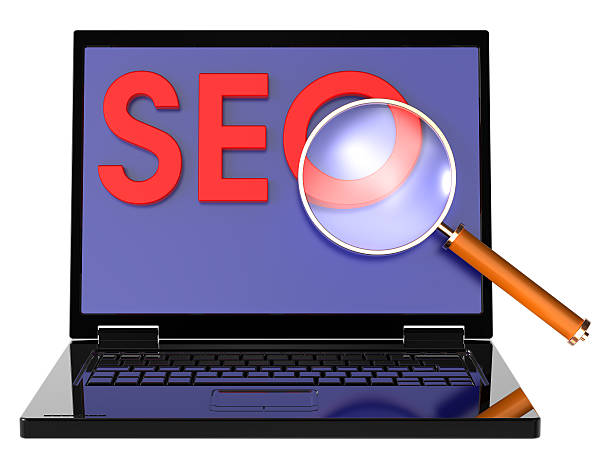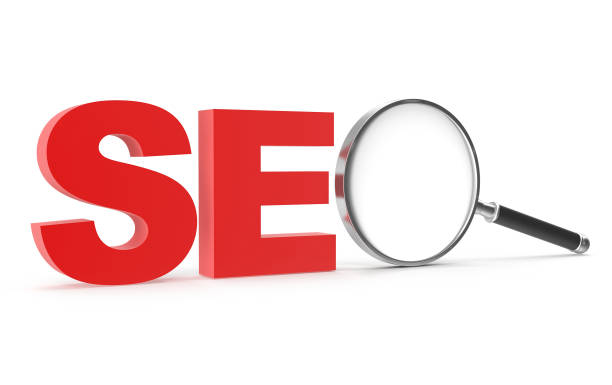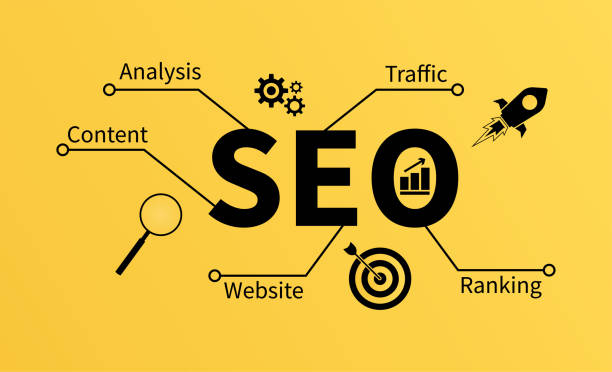Introduction to the World of SEO and its Importance in the Digital Age

SEO (Search Engine Optimization) or Search Engine Optimization, is a process aimed at improving a website’s ranking in the natural search results of search engines like Google.
In today’s world, where the internet has become an inseparable part of daily life, an effective online presence is vital for any business.
This is where the importance of #SEO becomes apparent.
Without a strong #SEO strategy, even the best content or products might get lost in the vast amount of internet information and never be discovered by the target audience.
SEO helps websites rank at the top of search results for relevant #keywords related to their field of activity, attracting more organic (free) traffic.
This traffic consists of users who are actively looking for information, products, or services that your website offers.
Therefore, the quality of this traffic is very high, increasing the likelihood of converting visitors into customers.
Proper implementation of SEO principles means structuring the website appropriately, producing valuable content, and gaining authority through link building.
These actions not only help search engines better understand your website but also improve the user experience.
Ultimately, SEO is a long-term investment that yields significant returns in increasing your online business’s visibility and growth.
Did you know that customers’ first impression of your company is your website? With a powerful corporate website from Rasawb, multiply your business’s credibility!
✅ Exclusive and eye-catching design tailored to your brand
✅ Improved user experience and increased customer acquisition
⚡ Get a free consultation now!
Types of SEO and Their Main Strategies

To understand SEO more deeply, we must become familiar with its different types.
Generally, SEO is divided into three main parts: On-Page SEO, Off-Page SEO, and Technical SEO.
Each of these sections covers different aspects of website optimization and is essential for overall success.
On-Page SEO refers to all optimizations performed within your website.
This includes producing high-quality and relevant content, correct usage of keywords in the title, meta descriptions, and body text, image optimization, internal link structure, and user experience improvement.
The main goal of On-Page SEO is to help search engines better understand the topic and value of your page’s content.
This section is mostly educational and practical, as it directly focuses on the content and internal structure of the site.
Off-Page SEO refers to activities performed outside your website to increase your domain’s authority and credibility.
The most important part of Off-Page SEO is Link Building.
Acquiring high-quality links from other reputable websites indicates trust in your content and signals to search engines that your website is trustworthy and authoritative.
Activity on social networks, influencer marketing, and acquiring positive reviews also fall into this category.
Finally, Technical SEO focuses on the website’s technical aspects that help search engines easily crawl and index your website.
This includes optimizing site loading speed, mobile compatibility, using an SSL certificate, creating XML Sitemaps, and a Robots.txt file.
These aspects are explanatory and ensure that your site’s technical infrastructure is ready for SEO.
Keyword Research: The Backbone of Content Strategy

Keyword research is one of the initial and vital steps in any SEO strategy.
Without identifying the words and phrases your target audience enters into search engines, you cannot create content that meets their needs and directs relevant traffic to your website.
This process involves discovering high-volume, low-competition keywords that can provide the best ranking opportunities.
There are various methods for keyword research.
Using tools like Google Keyword Planner, Ahrefs, Semrush, or KWFinder helps you identify search volume, competition level, and related keywords.
Also, analyzing keywords for which competitors are ranking can provide valuable insights.
Additionally, listening to customers and understanding their language in everyday conversations or feedback forms can help discover longer (Long-Tail Keywords) and more specific keywords.
Keywords should not be chosen based solely on search volume; User Intent is also highly important.
Is the user looking for information (informational keywords), intending to buy (commercial keywords), or searching for a specific website (navigational keywords)? Your content must align with user intent.
Producing high-quality and specialized content based on these keywords not only helps improve your ranking in SEO but also provides a better experience for visitors.
This approach forms the foundation of a successful content strategy.
| Keyword Type | User Goal | Example |
|---|---|---|
| Informational | Obtaining information, learning | How to do SEO? |
| Navigational | Reaching a specific site or page | Digikala website |
| Commercial / Transactional | Purchasing a product or service | Buy cheap laptop |
| Commercial Investigation | Comparing products, researching before buying | Best Samsung phone |
On-Page SEO for Ranking Improvement

On-Page SEO, as previously mentioned, refers to a set of optimization actions performed directly on your website pages to make them more attractive to search engines and users.
These actions include various aspects of content and page structure, all aimed at improving ranking and increasing organic traffic.
One of the most important elements of On-Page SEO is content quality and relevance.
Your content must be in-depth, comprehensive, unique, and answer users’ questions.
Natural and strategic use of researched keywords in the main title (H1), subheadings (H2, H3), first paragraph, and throughout the text is essential.
However, excessive keyword stuffing should be avoided, as this practice can lead to penalties from search engines.
Optimizing the Title Tag and Meta Description is also crucial.
The title tag is the text displayed in the browser tab and is the most important On-Page SEO factor after content.
The meta description is a short summary of the page’s content that appears under the title in search results and encourages users to click.
Although meta descriptions do not directly impact rankings, they affect the click-through rate (CTR).
Optimizing images using appropriate alt tags and compression to reduce size leads to improved page loading speed, which is an important ranking factor.
SEO-friendly URL structures, internal linking between related pages, and improving User Experience (UX) through easy navigation and responsive design are also among the key guidelines in On-Page SEO.
All these factors together signal to search engines that your page is valuable and relevant.
Are you tired of losing business opportunities due to not having a professional corporate website?
Rasawb, with its professional corporate website design, helps you:
✅ Build a powerful and reliable image for your brand
✅ Convert website visitors into loyal customers
⚡ Get a free consultation now!
Off-Page SEO and the Power of Link Building

Off-Page SEO refers to all activities performed outside your website to increase your domain’s authority and credibility in the eyes of search engines.
Among all these activities, Link Building is undoubtedly the most important and challenging part.
Links act as “votes of confidence” from other websites; the more high-quality and relevant links you receive from reputable sites, the more your domain’s authority with Google increases, and the higher your chances of ranking in search results.
But the important point is that not all links are equal.
Quality takes precedence over quantity.
One link from a reputable website relevant to your field of activity is far more valuable than dozens of links from low-quality or spammy websites.
Low-quality links can even harm your ranking.
Effective link-building strategies include creating extremely high-quality and valuable content (which naturally attracts links), content marketing, Broken Link Building, sponsored articles (advertorials), and social media activity.
Social media activity is also considered part of Off-Page SEO, as it can lead to increased brand awareness, content sharing, and ultimately, attracting natural links.
Although social media links are not directly counted as SEO backlinks, they help with content visibility.
Also, a precise analysis of competitors’ backlink profiles can improve your link-building strategies.
By examining their link sources, you can discover new opportunities to acquire your own links.
Overall, a strong and sustainable Off-Page SEO strategy complements On-Page SEO and is essential for achieving top rankings in SEO.
Technical SEO: Ensuring Site Accessibility and Understandability

Technical SEO (Technical SEO) may be the least glamorous part of SEO, but it is undoubtedly one of the most important.
This section focuses on optimizing your website’s technical infrastructure so that search engines can easily crawl, index, and rank your pages.
If your website has technical issues, even the best content and strongest backlink profile won’t help you appear in search results.
One of the fundamental factors in Technical SEO is site loading speed.
Users and search engines alike hate slow websites.
Optimizing images, using caching, compressing files (CSS, JavaScript), and choosing appropriate hosting are among the actions that increase site speed.
Google PageSpeed Insights is a suitable tool for checking and improving site speed.
Mobile-Friendliness is also highly important, as most searches today are conducted via mobile devices.
Your website should have a responsive design and work well on all screen sizes.
Using an SSL certificate (HTTPS) for website security is also a ranking factor and builds user trust.
Other topics such as SEO-friendly URL structure, using structured data (Schema Markup) to help search engines better understand content, managing 404 errors, and the Robots.txt file and Sitemap.xml are also part of Technical SEO.
Robots.txt tells search engines which parts of the site not to index, and the sitemap helps them find all important pages of the site.
These aspects are explanatory and infrastructural in nature, and without them, your efforts in other SEO areas might be fruitless.
Measuring SEO Success and Analytics Tools

After implementing SEO strategies, it is important to regularly measure and analyze your performance.
Without continuous monitoring, you cannot understand which actions have been effective and which need improvement.
Web analytics tools play a vital role in this process, providing valuable information about traffic, keyword rankings, user behavior, and many other metrics.
Google Search Console (GSC) and Google Analytics are two free and powerful Google tools that every SEO specialist should use.
Google Search Console provides direct insights into your website’s performance in Google search results, including the keywords users used to find your site, problems Google found in crawling or indexing your pages, and incoming links to your site.
This tool is crucial for any SEO strategy.
Google Analytics, on the other hand, provides comprehensive information about user behavior on your website: where they came from, how long they stayed on your site, which pages they visited, and what the conversion rate was.
This data helps you improve the user experience and optimize your content strategy.
In addition to these tools, paid tools like Ahrefs, Semrush, and Moz are also used for deeper competitor analysis, ranking monitoring, and discovering link-building opportunities.
Continuous monitoring of these metrics helps you make informed and data-driven decisions and keep your SEO strategy flexible.
| SEO Metric | Description | Related Tool |
|---|---|---|
| Organic Traffic | Number of visitors coming from natural search results | Google Analytics, Search Console |
| Keyword Ranking | Position of pages for specific keywords | Search Console, Ahrefs, Semrush |
| Bounce Rate | Percentage of users who visit only one page and leave | Google Analytics |
| Backlinks | Number and quality of links received from other sites | Ahrefs, Semrush, Moz |
| Page Speed | Time required to fully load a page | Google PageSpeed Insights |
Thought-Provoking Content and Its Impact on SEO

In the world of SEO, content is king, but not just any content.
Content that is thought-provoking and engaging not only involves users but also naturally leads to improved rankings in search engines.
Thought-provoking content is content that stimulates the user’s curiosity, makes them think, and encourages sharing.
This type of content can include in-depth research articles, interactive infographics, educational videos, or even online challenges and competitions.
The main goal of this content is to go beyond merely providing information and create a lasting experience for the user.
When users interact with your content – whether by reading longer, commenting, or sharing on social media – these positive signals are sent to search engines.
Search engines like Google seek to provide the best and most relevant results to their users.
Content that engages users and has a high interaction rate (such as longer time on page, lower bounce rate, and high sharing) indicates the quality and value of that content.
This indirectly helps improve SEO ranking.
Furthermore, thought-provoking content often naturally contains long-tail keywords, which are less competitive and can attract very targeted traffic.
For example, an article that addresses a hot topic or a complex question is more likely to be shared by users and receive natural links.
Producing this type of content ensures creative and sustainable SEO and helps your brand be recognized as a reliable authority in its field.
Is your company’s website as professional and trustworthy as it should be? With specialized corporate website design by Rasawb, create an online presence that represents your credibility and attracts more customers.
✅ Build a powerful and professional image for your brand
✅ Convert visitors into real customers
⚡ Get a free consultation now!
SEO Trends and the Future of Search Engine Optimization

The world of SEO is constantly changing and evolving, with search engine algorithms continually being updated.
To succeed in this field, awareness of current trends and future predictions is essential.
In recent years, the focus of SEO has shifted from merely keywords towards user experience, search intent, and high-quality, comprehensive content.
One of the most important current trends is Voice Search.
With the increasing use of voice assistants like Siri, Google Assistant, and Alexa, optimizing for voice search has become increasingly important.
This means focusing on conversational keywords and direct, concise answers.
Also, the growing importance of artificial intelligence and machine learning in Google’s algorithms means that content quality and its conceptual understanding have become more crucial than ever for search engines.
Another increasingly important topic is E-A-T (Expertise, Authoritativeness, Trustworthiness).
Google gives better rankings to websites that provide authoritative and specialized content from trustworthy sources.
This is especially vital for sensitive industries such as medicine and finance.
Furthermore, Core Web Vitals, which are metrics for measuring user experience on a website, have become an important ranking factor.
This includes loading speed, interactivity, and visual stability of pages.
Optimizing for Core Web Vitals not only improves SEO ranking but also significantly enhances the user experience.
Overall, the future of SEO is moving towards a more comprehensive and user-centric approach where quality, relevance, and user experience take precedence, and one must constantly seek to update their knowledge in this field.
Common SEO Mistakes and Ways to Avoid Them

In the process of SEO optimization, making mistakes can not only render your efforts fruitless but also severely damage your website’s ranking.
Awareness of these common mistakes and knowing ways to avoid them is crucial for anyone working in the field of SEO.
Some of these mistakes may seem minor, but they can have devastating effects.
One of the most common mistakes is Keyword Stuffing.
Excessive and unnatural use of a keyword in the text not only makes your content unreadable but is also identified by Google’s algorithms as a spam technique and leads to website penalties.
Instead, focus on producing valuable content and naturally using keywords and their synonyms.
Another mistake is neglecting site speed and mobile incompatibility.
In the current era, where most users search on mobile and are impatient, slow and non-mobile-friendly websites easily lose their rankings.
Investing in speed optimization and responsive design is essential.
Low-quality link building or buying links is also a big mistake.
While links are vital for SEO, low-quality or spammy links can harm your website.
Focus on acquiring natural and high-quality links from reputable sources.
Also, producing duplicate content or low-value content is a common mistake.
Google values unique and high-quality content.
Always try to produce content that stands out from others and adds real value to the user.
By avoiding these mistakes, you can create a sustainable and effective SEO strategy.
These tips will help you achieve the best results in an entertaining yet serious manner.
Frequently Asked Questions
| Question | Answer |
|---|---|
| What is SEO? | SEO, or Search Engine Optimization, is a process to increase the quality and quantity of website traffic by improving the site’s ranking in natural (organic) search engine results like Google. |
| What are the main types of SEO? | SEO is divided into three main categories: On-Page SEO, Off-Page SEO, and Technical SEO. |
| What does On-Page SEO include? | On-Page SEO includes optimizing elements within the website, such as keywords, Title Tag, Meta Description, content, URL structure, images, and internal links. |
| What is Off-Page SEO? | Off-Page SEO refers to activities outside the website that help improve its ranking, such as Backlink Building, social media marketing, and Brand Mentions. |
| What is Technical SEO? | Technical SEO focuses on optimizing the technical aspects of a website to help search engines crawl and index it better. This includes site speed, mobile-friendliness, site structure, Sitemaps, and Robots.txt file. |
| What role do Keywords play in SEO? | Keywords are phrases that users enter into search engines. Correct and targeted use of relevant keywords in content and site elements helps search engines understand your page’s topic and display it for relevant searches. |
| What is a Backlink and why is it important? | A backlink, or inbound link, is a link from one website to another. Backlinks act as a “vote of confidence” from other sites for search engines and play a significant role in a site’s authority and ranking increase, especially if they are from reputable sites. |
| How does quality content affect SEO? | High-quality, relevant, comprehensive, and unique content not only attracts and retains users but also signals to search engines that your page is valuable. This helps improve rankings, reduce Bounce Rate, and increase user time on site. |
| Why is site loading speed important for SEO? | Site loading speed is an important ranking factor for Google. Faster sites offer a better user experience, have lower bounce rates, and are preferred by search engines. |
| Is SEO a one-time process? | No, SEO is a continuous and long-term process. Search engine algorithms are constantly changing, competition is increasing, and website content also needs updating. Therefore, SEO requires continuous monitoring, analysis, and optimization. |
And other services of RasaWeb Advertising Agency in the field of advertising
Smart SEO: An exclusive service for growth and campaign management based on real data.
Smart UI/UX: An innovative service to increase click-through rates through optimizing key pages.
Smart Direct Marketing: A combination of creativity and technology for campaign management through proprietary programming.
Smart Data Analysis: Designed for businesses looking to increase click-through rates through proprietary programming.
Smart Link Building: A combination of creativity and technology to improve SEO ranking through SEO-driven content strategy.
And more than a hundred other services in the field of internet advertising, advertising consultation, and organizational solutions
Internet Advertising | Advertising Strategy | Advertorials
Sources
What is SEO? A Complete Guide
Off-Page Link Building in SEO
Keyword Research for SEO
Content Optimization for Google
? Rasawb Afarin Digital Marketing Agency is your trusted partner on the path to growth and transformation for your business in the online world. By providing comprehensive and innovative services including user-friendly website design, SEO, and content marketing, we help you achieve your digital goals and establish a special position in the digital market.
📍 Tehran, Mirdamad Street, next to Bank Markazi, Kazerun Jonubi Alley, Ramin Alley, No. 6




